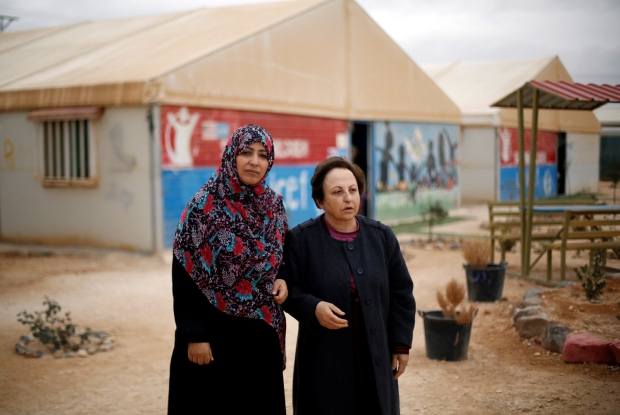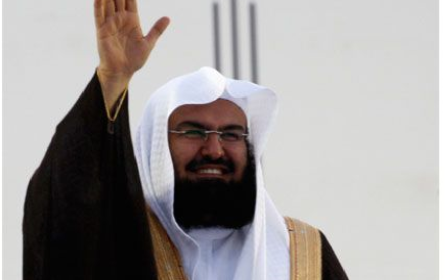Mideast peace bids top list of likely Nobel winners
NEW YORK, United States – The Middle East boasts a healthy number of Nobel Peace Prize laureates. But a glut of winners from Tunisia to Yemen has hardly ushered in the calm that the coveted Scandinavian awards are designed to promote.
This trend may continue on 6 October, when the five-member Norwegian Nobel Committee announces this year’s champ from a list of 318 candidates that involve several bids to steady Middle Eastern hotspots.
Among the bookmakers’ favourites are the architects of the nuclear deal with Iran, Syria’s troupe of White Helmets, embattled Turkish journalists and those aiding refugee flows from the region’s conflicts.
The fact that Nobel judges gravitate to the region is “not terribly surprising,” Henrik Urdal, director of the Peace Research Institute Oslo (PRIO), told Middle East Eye. Syrians, Iraqis, Yemenis and Palestinians endure some of the world’s most nettlesome conflicts.
Even the deal’s defenders would not say US-Iran ties are moving in a good direction.
- Sigurd Neubauer, analyst
But the $1.1m prize also has a patchy record in the region. Tunisia has made democratic strides since reform groups there won the 2015 prize, but other Nobel laureates from the region have gone on to launch wars or escalate them.
Israeli leader Menachem Begin ordered the invasion of Lebanon in 1982, four years after sharing the honour with Egypt’s Anwar Sadat for the Camp David peace deal. Yasser Arafat, Shimon Peres and Yitzhak Rabin, the brokers of the 1994 Oslo accord between Israelis and Palestinians shared a Nobel, but their peace was short lived.
For Sigurd Neubauer, a Norwegian analyst who focuses on the Gulf, long-standing questions about the prize’s credibility and whether judges are “arbitrary or politically motivated” are being asked louder than usual this month.
This is because Myanmar’s leader Aung San Suu Kyi is the latest in a long line of laureates to disappoint. She won her Nobel while under house arrest in 1991, but has been blasted for not stopping a wave of state-backed killings, rapes and the burning of villages of Rohingya Muslims.
Against this backdrop, MEE looks at the region’s hopefuls for 2017.
1. The architects of the Iran nuclear deal
If ever the 2015 nuclear deal with Iran needed a boost, it is now.
US President Donald Trump called it “an embarrassment” for his country and has indicated he may well move to scrap it ahead of a 15 October congressional deadline for re-certifying that Iran is complying with its terms.
The accord, which saw Iran trade sanctions relief for curbs on its nuclear programme, has been criticised by hardliners in both Tehran and Washington, but it is still backed by its Russian, Chinese and European co-signers.
A well-timed Nobel for Iranian Foreign Minister Mohammad Javad Zarif and EU Foreign Policy Chief Federica Mogherini would remind Washington that the deal has “broad international support,” said Urdal, of PRIO.
It may also nudge North Korean leader Kim Jong Un away from nuke tests and back to the negotiating table, he added.
Not everyone agrees. “Even the deal’s defenders would not say US-Iran ties are moving in a good direction; while Tehran’s relations with its neighbours are worse than they’ve been in years,” added Neubauer.
2. The White Helmets and the group’s head, Raed al-Saleh
If prizes were dolled out for manifest heroism, the civil defence squads from rebel-held parts of Syria would be a shoe-in. They are widely praised for dashing into bomb-hit buildings and pulling survivors from the rubble.
“It’s not their job, like the UN. They’re volunteers, risking their lives for others,” said Neubauer.
The group formed in 2013 and includes bakers, tailors, carpenters and electricians among some 3,000 members. As many as 130 have been killed.
They say they aim to stay neutral and save folks from all sides in the conflict. But they are not without controversy. The group is funded by the US, the Netherlands and other NATO members, prompting claims that it works against the Syrian government and its Russian and Iranian backers.
“As the conflict slips further off the world’s to-do list, the award would shine a spotlight on the ongoing hell being unleashed on civilians and the international community’s refusal to stop it,” Anna Nolan, director of The Syria Campaign, told MEE.
Refugees remain at the top of the global agenda. The number of uprooted people worldwide hit a record 65.6 million last year. The UN refugee agency, UNHCR, says more than half of them hail from the Middle East and Africa.
As such, the UNHCR and its Italian chief Filippo Grandi are touted as favourites to win this year’s Nobel. The agency has already won the prize twice, in 1954 and 1981 – during previous spikes in refugee numbers.
German Chancellor Angela Merkel is also tipped to win after allowing one million refugees into Germany during the height of the crisis in 2015, and for taking a hit at the ballot box when anti-immigrant parties fared well in last month’s elections.
Though Merkel and UNHCR have assuaged the human suffering, they have not grappled with the root of the problem, noted Urdal. “There are still no strong global initiatives to solve the refugee crisis,” he said.
4. Other candidates
Judges may follow their tradition of deploying Nobels to censure autocratic governments – as they did with Chinese dissident Liu Xiaobo in 2010 and Iranian human rights lawyer Shirin Ebadi in 2003.
That could win prizes for Turkey’s Cumhuriyet daily newspaper and its exiled former editor Can Dundar, who fell victim to President Recep Tayyip Erdogan’s crackdown on dissenters after the failed July 2016 coup.
Other Middle Eastern candidates include Saudi blogger Raif Badawi and jailed Palestinian lawmaker Marwan Barghouti. They face stiff competition from such global favourites as Pope Francis and the West African ECOWAS bloc that eased Gambia’s political transition.
Omani ruler Sultan Qaboos has a Facebook page dedicated to securing him a Nobel. The Arab world’s longest-serving monarch is praised for quietly easing tensions between Arabs and Israelis, Washington and Tehran and helping out in Yemen’s conflict.
“Has he moved mountains or brokered the magic Saudi-Iran detente? No. But he’s delivered on some clear and tangible issues," Neubauer noted. "The question is: Is the prize for effort and a lifetime of small results, or for one crowning achievement?”
The 2017 Nobel Peace Prize will be announced at 10am (BST) on 5 October at the Norwegian Nobel Institute in Oslo.
This article is available in French on Middle East Eye French edition.
Middle East Eye propose une couverture et une analyse indépendantes et incomparables du Moyen-Orient, de l’Afrique du Nord et d’autres régions du monde. Pour en savoir plus sur la reprise de ce contenu et les frais qui s’appliquent, veuillez remplir ce formulaire [en anglais]. Pour en savoir plus sur MEE, cliquez ici [en anglais].





